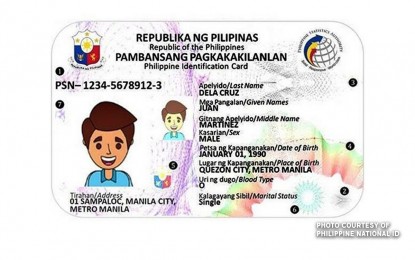
MANILA – The Philippine Statistics Authority (PSA) will open the registration process for the Philippine Identification System (PhilSys) project to the general public starting Jan. 18, Deputy National Statistician and PSA Assistant Secretary Rosalinda Bautista announced Wednesday.
Bautista said the PSA will be rolling out the first phase of the PhilSys registration in all provinces nationwide.
"Beginning next week January 18, magkakaroon uli kami ng (We will conduct anew) another Step 1 [registration], but now, including all provinces," she said in an interview aired on DWDD radio program.
At least 50 million Filipinos are targeted to be signed up by the end of 2021.
"For the whole year of 2021, we are committed to complete the registration of about 50 to 70 million Filipinos," Bautista said.
The PSA is currently conducting a small-scale and gradual rollout of the Step 2 PhilSys registration for those individuals who have already taken the first step.
Step 2 registration process involves the validation of supporting documents and capturing the registrants' biometric information, such as fingerprints, iris scans, and front-facing photographs at the registration centers.
The PSA has initially opened the registration centers for Step 2 processes in San Pablo City, Laguna.
Around 200 registrants were already provided with the personal serial number (PSN).
Bautista said the mass rollout for the Step 2 registration process might happen next month.
The PSA has initially rolled out the Step 1 PhilSys pre-registration to targeted low-income Filipinos in 664 cities and municipalities in 32 provinces identified as “low-risk” areas for the coronavirus, which began on Oct. 12, 2020.
Bautista said the PSA has pre-registered around 10.5 million Filipinos belonging to the low-income households identified from the "Listahanan" of the Department of Social Welfare and Development.
Bautista said Step 1 of the process involves pre-registration of targeted respondents through a house-to-house or doorstep interview.
National ID for OFWs
Meanwhile, Bautista said the PSA is preparing plans to register the overseas Filipino workers (OFWs) and the Filipinos residing abroad with dual citizenship.
"We will do a plan to do a pilot of the registration of overseas Filipinos in 2021," she said.
However, Bautista said the PSA is planning to conduct actual registration of OFWs by 2022, which will be happening abroad.
"'Wag po sana kayo mainip at ang gusto po sana namin na sigurado maayos at safe 'yung inyong data para po sa (Please don't get bored because we just want to make sure that your data is safe and secured for the) generation of the national ID," she said.
PhilID issuance, validity
Bautista said the Philippine identification (PhilID) or the national ID will not replace the existing functional IDs that serve other purposes.
She added the PhilID is a foundational ID that serves as a valid proof of identity which would help ease transactions with both government and private sector through easier validation and authentication of identity.
Bautista said the PhilID is acquired for permanent use and has no expiration date. The PhilID issued to resident aliens or foreign nationals residing in the country will be valid for only one year.
Acquiring PhilID for Filipinos is free of charge for the initial issuance.
The PSA said the fee shall only apply for the replacement of the PhilID due to damage or loss.
The holders of certificate of indigency, meanwhile, are exempted from the replacement fee, as long as they present this certificate.
Data privacy, security
When asked about the security of the PhilID, Bautista assured that the government has adopted the very complex privacy-protective system and Privacy-by-Design principles for data protection.
She said the PhilSys has sufficient safeguards to ensure the safety, security, and data privacy of the registry information. The only person who can provide data stored in the PhiSys registry remains to be the owner of the data.
The implementation of PhilSys is anchored with the whole-of-government approach to ensure that the Data Privacy Act of 2012 is strictly observed, she added.
"The Department of Information and Technology, the National Privacy Commission, and the National Security Council are looking into all of these processes," she said.
Bautista assured that the system has undergone a stringent privacy impact assessment to ensure the protection of the collected data and information.
"Not even our employees can really see the data," she said, noting that once the data are collected during the Step 1 process, the information will automatically be encrypted.
She added that the information will not be disclosed to anyone, without the permission of the data owner.
"I can say your data is very safe with the PSA under the national ID," Bautista said.
Signed into law by President Rodrigo Duterte in August 2018, Republic Act 11055, or the Philippine Identification System Act, aims to establish a single national ID for all Filipinos and resident aliens.
The national ID shall be a valid proof of identity that shall be a means of simplifying public and private transactions, enrollment in schools, and the opening of bank accounts.
It will also boost efficiency, especially in dealing with government services where people will only need to present one ID during transactions. (PNA)
